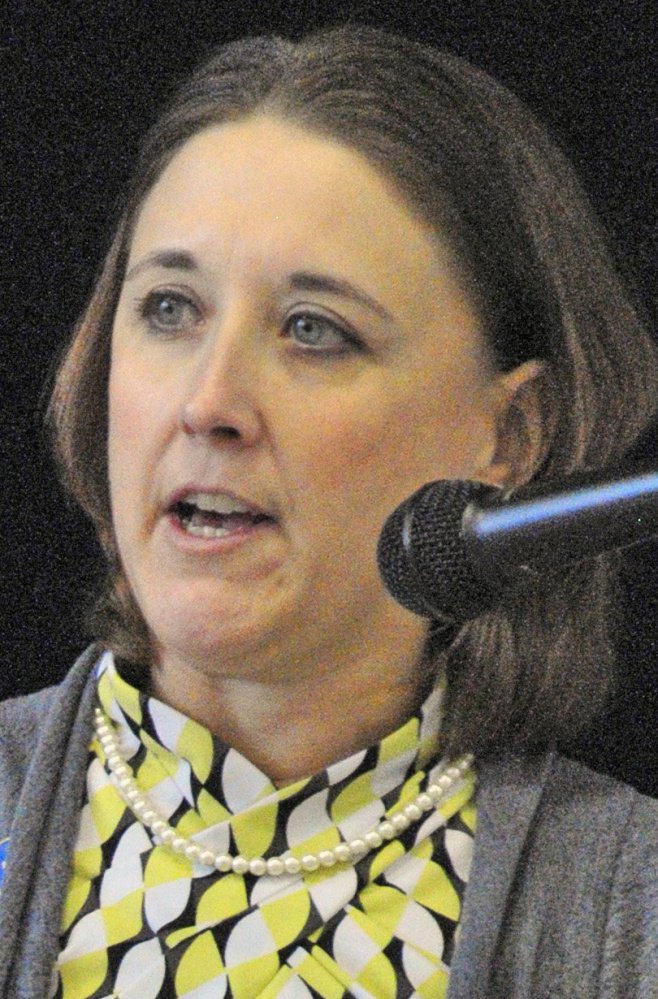AUGUSTA — A member of the Republican leadership in the Legislature is asking for a special panel to tackle Maine’s opioid crisis.
Rep. Ellie Espling, R-New Gloucester, the House assistant minority leader, said she anticipates a plethora of bills in 2017 aimed at stemming drug overdoses that are killing an average of seven Mainers a week. In the previous session, several committees handled a wide range of measures, including changes in addiction treatment programs, hiring more drug agents, making the overdose antidote Narcan more widely available, and tightening prescribing policies for opioid medications.
Espling has submitted a letter to House Speaker Sara Gideon, D-Freeport, and Senate President Mike Thibodeau, R-Winterport, asking them to convene a joint select committee to work solely on the drug crisis.
“It is with the utmost respect to the speaker and Senate president and the difficult decisions they have in front of them that I make this request,” Espling said in a statement issued Tuesday. “I anticipate a great number of bills being submitted to address the drug epidemic as legislators from all ideological backgrounds bring their ideas forward. By appointing a committee to focus solely on these bills, my hope is we can work toward a solution to a problem that is killing more Mainers every day.”
In her letter, Espling suggests the new committee could focus on key areas, including law enforcement, treatment and education.
“Heroin, fentanyl and opioids are killing Maine people at an alarming rate,” Espling wrote. “Recent media reports show that drugs are now killing more Mainers than car accidents. To put that in perspective, just five years ago deaths from car accidents outnumbered drug overdoses 9:1.”
Thibodeau and Gov. Paul LePage, also a Republican, did not respond Tuesday to messages seeking comment on Espling’s request.
Gideon said Espling’s idea for a joint select committee was “really appealing,” but the House speaker wasn’t sure a panel with just lawmakers would lead to the best solutions.
“I am really glad Rep. Espling has brought this idea forward and there is no question that we need a laser focus on this issue,” Gideon said. “A joint select committee would force us to look at this issue and take action on it together, but the major question in my mind is whether this type of task force or committee is best served by having just legislators on it, or should it be some sort of commission that has people who are actually experts in this field, as well as some legislators.”
Gideon said Espling’s request had started an important conversation that she and Thibodeau will have to work through.
“It’s worth doing, and it’s worth doing the right way,” Gideon said. “The question now is, just how do we do that?”
This month, the LePage administration announced that the state would spend an additional $2.4 million a year on medication-assisted treatment for those addicted to opiates who don’t have health insurance. The move by Department of Health and Human Services Commissioner Mary Mayhew will create 359 new slots for the uninsured and is the latest effort to combat the state’s worsening drug crisis, which has led to a record number of overdose deaths – 286 for the first nine months of 2016.
The Legislature now has 16 joint standing committees, one special joint committee on rules, and the Legislative Council. Special joint committees are typically made up of 10 lawmakers, including three members of the Senate and seven members of the House.
The last time the Legislature created a select joint committee was in 2011, when it formed a panel to deal with a bill offered by LePage to streamline business regulation and simplify permit requirements for developments in Maine’s 10 million acres of unorganized territory. The Joint Select Committee on Regulatory Fairness and Reform held hearings statewide on 36 proposed changes to Maine environmental law. The Legislature eventually passed the bill and LePage signed L.D. 1 into law.
The massive new law had 13 parts. Among other things, it restructured parts of state government and created an ombudsman program for businesses aimed at resolving conflicts between businesses and state government on permitting, licensing and other regulations.
Send questions/comments to the editors.





Comments are no longer available on this story